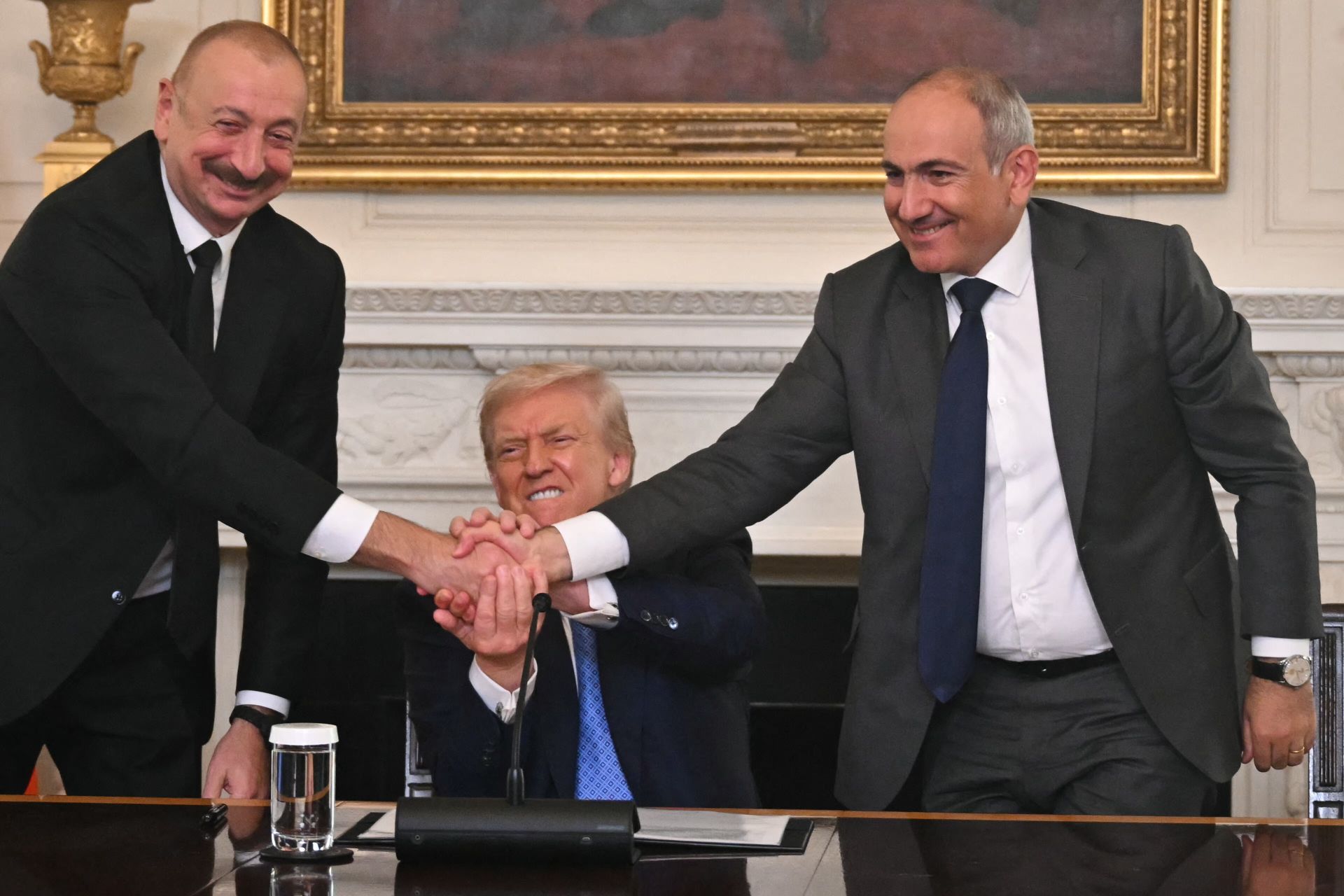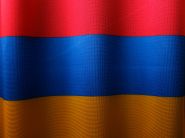- Home
- Middle East
- Trump Says Armenia and Azerbaijan Commit to End Fighting 'Forever'

US President Donald Trump (C), Azerbaijani President Ilham Aliyev (L) and Armenian Prime Minister Nikol Pashinyan shake hands after signing an agreement in the State Dining Room of the White House in Washington, DC, on August 8, 2025. ©Andrew Caballero-Reynolds / AFP
Armenia and Azerbaijan have committed to a lasting peace after decades of conflict, US President Donald Trump said after the South Caucasus rivals signed a deal welcomed on Saturday by Iran and Western nations.
Armenian Prime Minister Nikol Pashinyan and Azerbaijan's long-time President Ilham Aliyev said Trump's mediation should earn him a Nobel Peace Prize, an award the US leader has been vocal about seeking.
The two former Soviet republics "are committing to stop all fighting forever, open up commerce, travel and diplomatic relations, and respect each other's sovereignty and territorial integrity," Trump said at a White House signing event on Friday.
However, the fine print and binding nature of the deal between the longtime foes remained unclear.
The two leaders would have a "great relationship," Trump said.
"But if there's conflict... they're going to call me and we're going to get it straightened out," he said.
Christian-majority Armenia and Muslim-majority Azerbaijan have feuded for decades over their border and the status of ethnic enclaves within each other's territories.
They went to war twice over the disputed Karabakh region, which Azerbaijan recaptured from Armenian forces in a lightning 2023 offensive, sparking the exodus of more than 100,000 ethnic Armenians.
'Historic Signature'
The Azerbaijan and Armenian leaders shook hands under the satisfied gaze of Trump before all three signed a document the White House called a "joint declaration."
Aliyev hailed the "historic signature" between two "countries that were at war for more than three decades."
"We are today establishing peace in the Caucasus," he said.
Aliyev offered to send a joint appeal, along with Pashinyan, to the Nobel committee recommending Trump receive the Peace Prize.
"Who, if not President Trump, deserves a Nobel Peace Prize?" he said.
Aliyev also thanked Trump for lifting restrictions on US military cooperation with Azerbaijan, which was announced on Friday.
Pashinyan said the "initialing of (the) peace agreement will pave the way to end decades of conflict between our countries and open a new era."
The Armenian leader said the "breakthrough" would not have been possible without "peacemaker" Trump.
"Today, we can say that peace has been achieved," Pashinyan told a news conference after signing the deal.
The agreement includes establishing a transit corridor passing through Armenia to connect Azerbaijan to its exclave of Nakhchivan, a longstanding demand of Baku.
The United States will have development rights for the corridor, dubbed the "Trump Route for International Peace and Prosperity," in the strategic and resource-rich region.
Iran, which has long opposed the corridor over fears it would cut the country off from the Caucasus, welcomed the deal on Saturday.
However, it also expressed "concern over the negative consequences of any foreign intervention in any way or form, especially in the vicinity of common borders."
The foreign ministry in Turkey, a longtime supporter of Azerbaijan, hailed the "progress achieved towards establishing a lasting peace."
UK Foreign Secretary David Lammy congratulated the two countries "on the bold steps taken in Washington."
European Union chiefs said it would pave the way to "lasting, sustainable peace for both countries and across the entire region."
'Strategic' Partner
Azerbaijan and Armenia agreed on the text of a comprehensive peace deal in March.
However, Azerbaijan later outlined a host of demands, including amendments to Armenia's constitution to drop territorial claims for Karabakh, before signing the document.
Pashinyan has announced plans for a constitutional referendum in 2027, but the issue remains deeply divisive among Armenians.
Asked what Armenia stood to gain from Friday's deal, a White House official said it was "an enormous strategic commercial partner, probably the most enormous and strategic in the history of the world: the United States of America."
"The losers here are China, Russia, and Iran," he said, speaking on condition of anonymity.
The disputed mountainous enclave of Karabakh is internationally recognized as part of Azerbaijan but was controlled by pro-Armenian separatists for nearly three decades after a war following the breakup of the Soviet Union.
Azerbaijan captured part of the territory during a 2020 war, then took all of it three years later. Almost the entire local population of around 100,000 ethnic Armenians left for Armenia.
AFP
Read more



Comments